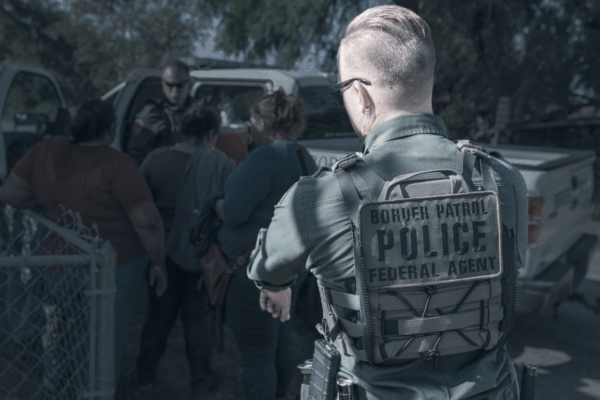While on duty in 2017, Border Patrol agent Matthew Bowen was driving in a government-issued pickup truck when he saw Antolin Rolando Lopez-Aguilar, a migrant from Guatemala, attempting to cross into the United States.
During his eleven years as an agent, Bowen had experienced many similar scenes. But instead of following protocol when he saw Mr. Lopez-Aguilar running away, Bowen hit him with the pickup truck. Twice.
Now, after pleading guilty to misdemeanor charges, Bowen was finally sentenced in late November 2019. He received just three years of probation.
Bowen’s actions were only the latest in a documented history of violent behavior and anti-immigrant attitudes. Court documents revealed a series of hateful, racist text messages in which he refers to people attempting to cross into the U.S. as “disgusting subhuman shit unworthy of being kindling in a fire.” He had also been investigated several times for use of excessive force.
These messages and actions are tragically reflective of a culture of violence and dehumanization within the nation’s largest law enforcement agency, Customs and Border Protection (CBP). A culture that has been emboldened by President Trump’s own vile rhetoric, including suggestions that agents shoot migrants in the legs.
Even Bowen’s own attorney admitted that his client’s racist remarks toward migrants are “commonplace throughout the Border Patrol’s Tucson Sector” and “part of the agency's culture.”
The question remains whether Congress will ever hold CBP accountable for its ongoing abuses.
Congress’ funding deluge over the past decade rapidly expanded hiring and included little to no concern for consequences. Border Patrol’s own union warned the agency about watered-down training and hiring standards, hiring “bodies” that would prove to be unqualified, if not fully corrupt.
By the time Trump took office, CBP employed 19,437 Border Patrol agents, with roughly 85% tasked with patrolling the southwest border — amounting to nearly nine agents per linear mile.
Much of what we know about the agency’s culture is from investigative reporting, independent reports by non-governmental organizations, and documents obtained through Freedom of Information Act requests and litigation.
Between 2006 to 2016, the Cato Institute found that CBP misconduct outpaced other federal law enforcement agencies. Their analysis further noted that incomplete or inconsistent publicly available information made it “virtually impossible to assess the extent of corruption or misconduct” within the agency. In 2017, data obtained by the American Immigration Council revealed CBP took “no action” in 95.9% of complaints made against agents over a three-year period, including verbal abuse, theft of property, and physical assault.
Since January 2010, at least 98 people — including some U.S. citizens — have died following encounters with CBP personnel. And since 2003, seven individuals were shot across international borders as an escalated response to alleged rock-throwing. At least 12 migrants have also died in CBP custody in 2019, including many children — after a decade where no children died in CBP detention.
The agency’s culture of cruelty also seeps into detention conditions. Just last year, the ACLU and University of Chicago International Human Rights Clinic reviewed more than 30,000 pages of documents dating back to 2009 that describe shocking violence and abuse against migrant children in CBP custody, including verbal, physical and sexual abuse. Officials were aware of these abuses but failed to properly investigate or remedy them.
It’s clear that these abuses result from cultural deficits within the agency, not resource limitations, as the agency has claimed.
For now, Matthew Bowen is no longer a Border Patrol agent; he resigned as a part of his plea deal. But others like him are still in the ranks, as evidenced by the now-infamous Border Patrol agent Facebook group, replete with agents posting racist and sexually violent memes and reported by former agents turned whistleblowers.
We must value human life above anything else. And we must urge Congress to immediately address CBP’s systemic failures through robust oversight. To begin, Congress should require CBP to document and publicly report data on all uses of force and stops and searches, end its abusive detention conditions, and hold agents accountable when they violate agency policies that should serve to protect all people.
CBP must be transformed into an agency unrecognizable from its prior self, no longer shrouding its abuses behind iron curtains. Anything less all but ensures further abuse by an agency where cruel treatment of the most vulnerable has become the norm.


